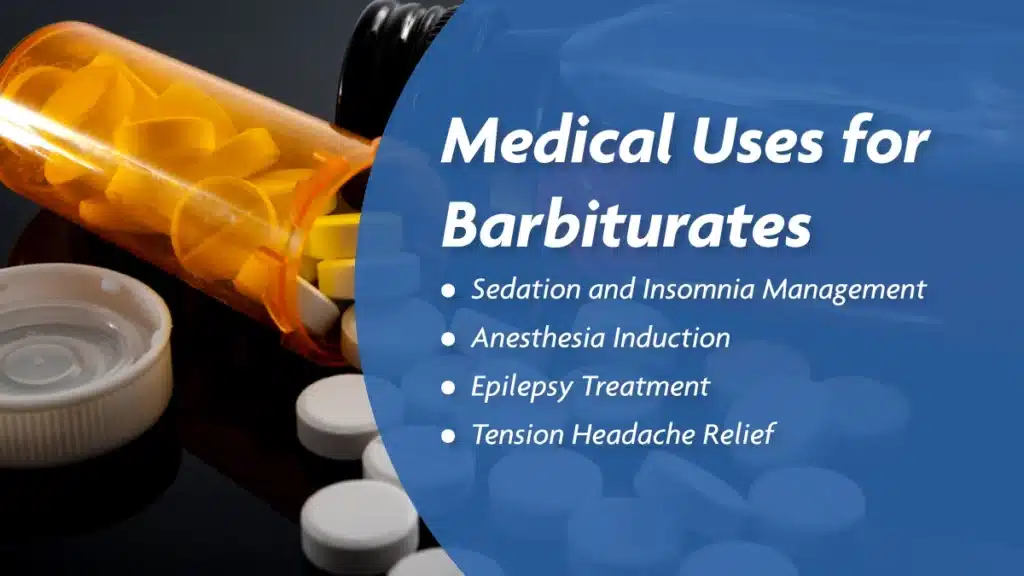Barbiturates are a type of drug that acts on the central nervous system, acting as sedatives or hypnotics. Doctors once commonly used these drugs to treat anxiety, insomnia, and seizure disorders.
However, due to their high potential for barbiturate addiction and overdose, they have primarily been replaced by safer alternatives. Barbiturates can cause drowsiness, relaxation, and a calming effect by slowing down brain activity. Despite their historical significance in medicine, their use is limited, and healthcare professionals advise caution due to the associated risks.
Key Takeaways
Barbiturates are sedative drugs, initially used widely but now limited due to abuse and risks. Here’s what you need to know:
- There are various drug types of barbiturates, each with its own distinct properties and medical purpose.
- Medicinal and illicit use can lead to short and long-term effects on your overall well-being.
- In case of overdose, stay with the person, perform CPR, and call for help.
Our teen treatment center stands with teenagers dealing with addiction. Call us today at (845) 479-6888 for more information.

Historical Background of Barbiturates
In the medical field, barbiturates have a significant historical background. They were once the first line of treatment for various conditions, offering the desired effect of sedation and relaxation.
Over time, concerns about their safety led to the exploration of safer alternatives, like benzodiazepines, which could achieve similar results in smaller doses. Barbiturates are class B drugs, each acting similarly by depressing the central nervous system.
Current Legal Status and Prescription Requirements
Despite their past prominence, barbiturates’ usage has diminished due to their harmful effects and highly addictive nature. Notably, barbiturates were historically used in lethal injections and were considered during benzodiazepine withdrawal.
In the United States, barbiturates are still legally available, but doctors rarely prescribe them due to concerns about their dose-dependent side effects and the potential for abuse. Newer drugs with safer profiles have largely replaced barbiturates for medical use. These central nervous system depressants require a prescription, and their use today is limited to specific medical conditions, such as epilepsy or certain types of anesthesia.
How Barbiturates Work
Barbiturates are a group of prescription drugs that affect the brain functioning.
Barbiturates enhance the activity of gamma-aminobutyric acid (GABA), a neurotransmitter in the brain that inhibits brain function. They bind to the GABAA receptor, leading to a calming effect. However, the use of barbiturates among teens comes with adverse effects, such as damaging brain development, especially at high doses.
Regular use can result in barbiturate addiction, and sudden cessation may cause severe withdrawal symptoms. Barbituric acid can negatively react with other drugs, and that is why doctors seldom prescribe them under medical supervision.
Common Barbiturates
Barbiturates encompass a variety of drugs, each with distinct properties and medical applications. These medications are classified based on their duration of action and therapeutic uses.
Phenobarbital: Phenobarbital is known for its long duration of action and use in the treatment of epilepsy. It enhances the action of GABA, a neurotransmitter that regulates brain activity.
Secobarbital: It is another short-acting barbiturate type primarily used for anesthesia and insomnia treatment. Its rapid onset makes it suitable for short-term relief.
Amobarbital: This type is with intermediate duration, and medical experts use this as a sedative and hypnotic. However, due to the risk of substance use disorders, medical advice is crucial when considering its use.
Butalbital: It is often combined with other medications like antihistamines and is utilized to alleviate stress headaches. Caution is advised, as its misuse can adversely affect blood pressure.
Pentobarbital: It is known for its rapid onset and short duration and has been used in medical procedures and, controversially, in fatal injections.
Thiopental: An ultra-short-acting barbiturate primarily used for anesthesia induction. It acts rapidly but has a short duration, making it suitable for medical procedures requiring brief unconsciousness.
It’s important to note that barbiturates carry risks, and newer, safer groups of sedative-hypnotics have primarily replaced them in medical practice. Given the potential for misuse, especially among young adults, careful consideration and consultation with healthcare professionals are essential before using these medications.
Medical Applications of Prescription Barbiturates
Barbiturates have served as valuable tools in the medical field, addressing various health concerns with their distinctive properties.
Barbiturates, such as amobarbital and secobarbital, excel in promoting sedation and managing insomnia. Enhancing the effects of a neurotransmitter called GABA induces a calming effect on the brain, helping individuals achieve much-needed relaxation and restful sleep.
In anesthesia, short-acting barbiturates like thiopental play a critical role. Their rapid onset of action allows for quick induction of unconsciousness, facilitating surgical and medical procedures. The precise control over the depth and duration of anesthesia makes them valuable in anesthesiology.
Long-acting barbiturates, including phenobarbital, have been instrumental in managing epilepsy. By modulating the activity of neurons, particularly those prone to excessive firing, these barbiturates help prevent seizures. However, their usage has declined due to concerns about side effects and the advent of newer antiepileptic medications.
Combining barbiturates like butalbital with other medications, such as antihistamines, can provide effective relief for tension headaches. The soothing properties of barbiturates contribute to the overall calming effect, reducing headache-related discomfort.
While barbiturates have shown efficacy in these medical applications, their employment has waned due to safety issues and the availability of alternative drugs.
How Sedative-Hypnotic Drugs Are Abused
Barbiturates, initially prescribed for medical purposes, have increasingly become subject to non-medical use and abuse, posing severe risks to individuals who engage in recreational or unauthorized consumption. Barbiturates may be referred to by street names such as “downers,” “yellow jackets,” or “blue devils” in non-medical contexts.
- Some individuals misuse barbiturates for their calming effects, seeking a sense of peace or ecstasy.
- Prolonged or frequent use of barbiturates can lead to physical and psychological dependence, where individuals may find it challenging to function without the drug.
- The development of tolerance is common, necessitating higher doses to achieve the same effects, increasing the risk of overdose.
- Barbiturates are often combined with other substances, such as alcohol or opioids, intensifying their central nervous system depressant effects and heightening the risk of adverse outcomes.
- Barbiturate misuse carries a significant risk of overdose, leading to respiratory failure, lowered heart rate, and, in extreme cases, death.
Today, despite their limited medical use, barbiturates persist in non-medical contexts, particularly among teens. Understanding the risks associated with the recreational use and abuse of barbiturates is crucial to curbing their misuse. Strategies to prevent drug dependence through raising awareness and addiction treatment can also improve the current state.
Leading Causes of Barbiturate Abuse
People misuse barbiturates for different reasons. Pharmaceutical companies for medical use introduced these drugs, but they are easily available for misuse. Some individuals use barbiturates to cope with stress, anxiety, or sleep problems, not realizing the dangers involved.
Sometimes, friends or societal expectations influence this misuse among teens, especially for vulnerable individuals. The availability of these drugs, initially meant for medical reasons, can create an environment where people abuse them. It’s important to understand the root cause of addiction in order to treat barbiturate addiction.
Risks and Side Effects of Barbiturate Use
Understanding the risks associated with barbiturates is crucial for informed decision-making in medical treatment. Awareness of potential adverse effects empowers healthcare professionals and patients to make informed choices, promoting safer medication practices and overall well-being.
In the short term, barbiturate use can lead to a range of side effects, including drowsiness, dizziness, and impaired coordination. These drugs depress the central nervous system, often resulting in a calming effect.
However, excessive doses or misuse can lead to more severe consequences, such as respiratory depression, lowered blood pressure, and even coma. Short-term use of barbiturates can also lead to dependence and tolerance, necessitating higher doses to achieve the desired effect.
Long-term use of sedative-hypnotic medications poses significant risks. Chronic use can lead to the development of barbiturate addiction, characterized by physical and psychological dependence.
Abrupt cessation of these drugs may trigger severe withdrawal symptoms, including suicidal thoughts, seizure disorders, and hallucinations. Prolonged use is also associated with cognitive impairment and memory deficits. Moreover, the risk of overdose increases with long-term use, potentially resulting in life-threatening complications.
Barbiturate overdose poses a serious medical emergency, and recognizing the symptoms is crucial for prompt intervention. Overdose symptoms include extreme drowsiness, confusion, slowed breathing, and muscle weakness. Quick action is paramount.
If someone exhibits these signs, call emergency services immediately. While waiting for help to arrive, do not leave the patient alone. If breathing is slow or absent, administer CPR if trained. Avoid administering anything orally.
Treatment options for barbiturate overdose vary and may involve supportive care, activated charcoal, or, in severe cases, medical interventions to counteract the effects. Understanding the dangers associated with different types of barbiturates and their potential consequences is vital for ensuring a timely and appropriate response to a barbiturate overdose.
Frequently Asked Questions (FAQ)
What drugs are considered barbiturates?
Barbiturates include pentobarbital, secobarbital, amobarbital, phenobarbital, and thiopental. These medications affect normal brain function and were historically used for various purposes, including sedation and the treatment of epilepsy.
What are barbiturates, and what do they do to your body?
Barbiturates are a group of drugs that act as central nervous system depressants. They enhance the effects of the neurotransmitter GABA, leading to sedation and a calming effect. Barbiturates were once widely prescribed but are now less common due to the risk of dependence, overdose, and the availability of safer alternatives.
How do barbiturates interact with other drugs?
Barbiturates can interact with various medications, affecting their effectiveness or increasing the risk of side effects. They often enhance the effects of other addictive substances, such as alcohol or opioids, leading to increased sedation and respiratory depression. Additionally, barbiturates can alter the metabolism of many drugs in the liver, potentially reducing their levels in the bloodstream.
Helping Teens Grow and Recover
Our teen treatment center understands the struggle of the younger generation dealing with addiction and offers holistic services. At our residential facility, we provide group therapy sessions as well as family therapy to rebuild the bonds. During barbiturate addiction treatment, our team of medical experts craft individual programs for teens to find stability in life without relying on drugs. Secure the future of your teen today. Call us at (845) 479-6888 for more information.


